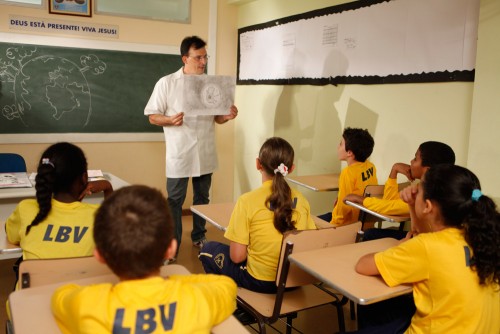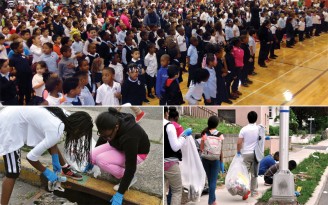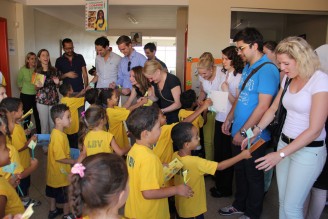
Solidary Citizenship
Education as a means of confronting discrimination and violence against women.
Suelí Periotto
Friday | October 18, 2013 | 4:08 PM | Last update: September 22, 2016, 4:07 PM (Brasilia time)

Educational actions (formal and informal) play a fundamental role in improving the living conditions of women, both in Brazil and in the world. And this support can be decisive regarding the problem of gender inequality and of violence towards women, from childhood all the way to old age.
It is necessary to encourage all open environments to hold dialogues about the empowerment of women. This way, the subject can be constantly discussed in recreational or pedagogical programs where information, explanation, and proposals can be gathered to eradicate aggression against girls, female teenagers, and women. This is a dramatic and intolerable situation observed worldwide, due to the high number of these incidences.
Initiatives that can make a difference in changing this current reality can and should arise from the school environment—a starting point for the construction of a fairer society where men and women have equal access to work opportunities (wages and professional growth), based on individual effort and on each person’s own skills and competence, without gender prejudice.

SÃO PAULO, SP — Na Escola da Legião da Boa Vontade o conteúdo pedagógico é aliado à formação cidadã. Nesse contexto, diversas atividades são realizadas para a promoção da consciência socioambiental.
In Brazil and in the other six countries where it has autonomous units—Argentina, Bolivia, Paraguay, Portugal, the United States, and Uruguay—, the Legion of Good Will strives to provide on a daily basis assistance to thousands of girls and boys. In its teaching units, the Organization offers quality education, adding values of Ecumenical Citizenship to the intellectual development, so that students have the necessary basis to continue their studies and enter university. In its schools and socio-educational programs, the LBV applies its own pedagogical method created by its President, educator José de Paiva Netto. According to this method, reason and feeling (Brain and Heart) guide the learning process, so that the results achieved in basic education can allow the student to build a worthy and satisfactory professional life.
An important element of this pedagogical proposal is to contribute to awaken in students a critical view of things and an attitude that favors competence, always in harmony with feelings. To this end, the LBV applies the Pedagogy of Affection (directed at children up to the age of 10) to reinforce cognitive and emotional aspects. The emphasis on feeling does not lessen anything from the critical sense of the learner. On the contrary, a heart nourished by the practice of Solidarity, Brotherhood, and Friendship can achieve a higher level of understanding. Education that includes ethical, ecumenical, and spiritual values enhances children’s protagonism and accentuates their ability to respect others and themselves, without the risk of de-characterizing or weakening their own personality.
+ LBV is organizing the 13th edition of its International Education Congress
A space for dialogue and reflection
The classrooms of the LBV’s schools also represent a space open for debate and discussion about topics that are of interest to the students, especially those going through adolescence. The Ecumenical Citizen Pedagogy is directed at them. To better prepare them to face the situations that are typical of youth, activities involving research and the exchange of information are carried out. Through this work, the students share their knowledge, clear up doubts and, in this way, increase the level of individual and collective understanding. Thus, the exercise proposed and mediated by the educators promotes the pedagogical content and expands the understanding of the subject that is under discussion.
The LBV’s pedagogical proposal has its own methodology, the MAPREI—Learning Method through Rational-Emotional-Intuitive Research. This is a facilitating tool that allows a greater participation of students in the subjects proposed by the teacher. The MAPREI comprises of six stages. In the second one, for example, the students conduct a research about the subject that is to be debated in class. The development of the ability to search for knowledge is a factor that favors the student’s experience of autonomy. At the same time, it also strengthens the awareness of the rights of citizens and prepares them to face and overcome situations of violence and discrimination, among other challenges.

This kind of orientation in the classroom has made it possible for girls to develop critical thinking, a responsible behavior, and knowledge on how to turn to women’s defense services if necessary. It has also helped boys to provide their mothers and sisters with guidance on defending themselves against occasional partners who might mistreat them, denouncing abuse. At the LBV, children and adolescents learn the value of citizenship and of solidarity, becoming aware that in the future they will have conditions and the duty to treat their spouse with affection and respect.
Students discuss gender equality in the classroom
The active participation of the students in the Coexistence classes is an example of their involvement with current affairs. This subject invites students to research/discuss important day-to-day topics, such as the Maria da Penha Law. In the high school grades of the José de Paiva Netto Educational Institute in the capital city of São Paulo, Brazil, this theme was proposed to the adolescents. The students then researched the facts that caused this important law to be passed. Today, it protects not only women but also men, the elderly, homosexuals, the physically impaired, and others who feel vulnerable or victimized by prejudice and/or violence. When sharing the data obtained, it was remarkable the way the students expressed themselves while making their comments, demonstrating confidence in their statements. The girls showed maturity and familiarity with the rights that the law guarantees them. The boys, besides reflecting knowledge of the subject, reasserted the importance of the social role of each individual, regardless of gender.
Guiding the new generations
Watch the video with the students of the José de Paiva Netto Educational Institute, from São Paulo (Brazil), who talk about domestic violence and what the Maria da Penha Law determines.
In the family-school partnership, the Legion of Good Will also creates bonds with the parents or legal guardians of the students, by means of activities that result in benefits for the family nucleus. In this manner, it encourages the participation of the community in meetings to discuss, at the school, issues of interest to the local people and to society in general. Women—mothers, grandmothers or those responsible for the child or adolescent—turn, when necessary, to the professionals of the Social Service and Educational Psychology departments. There, they receive guidance, support, and are referred to the appropriate government agencies, according to the situation they describe and the field of the professional appointed to help the family. Women in particular are the ones that get the most support in terms of understanding and solving specific problems: acquiring their institutional rights and improving personal and family development.
The conclusion of this article is neither a finished solution nor a fully solved situation, but one can already see a set of achievements that has decisively transformed the lives of children, young people, and women benefited from the support received from the school.
In the view of the president of the LBV, positive progress towards gender equality is inevitable. In the article “The Millennium of Women”, forwarded to the UN in several languages, he states:
“There is no way to prevent—as today a simulated some would like—the outstanding and fruitful participation of women in the various sectors of society so that progress may be successful in magnificent crusade for the rescue of citizenship (…). The adherence to this crusade naturally includes those who manage governmental and political actions, in which the existence of the renewing inspiration of Ecumenical Spirituality is essential and without which efficiency will fall short of popular aspirations. (…) The role of women is so important that, even with all the obstacles offered by a chauvinist male culture, no organization that wishes to survive—whether religious, political, philosophical, scientific, sportive, business, or a family—can dismiss her support.”
___________________
* Suelí Periotto is an educator with a postgraduate degree in School Management and Human Sciences Methodology, and is currently working on her Master’s degree in Education at PUC-SP. She is also a conference speaker and the host of the Educação em Debate [Education on Focus] program of the Super Good Will Radio Network (Follow the program at www.boavontade.com – available only in Portuguese).


